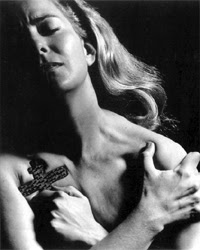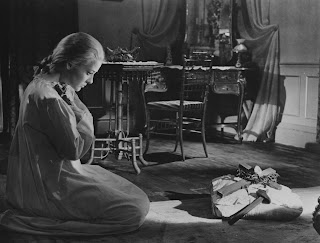A lampoon on organized religion and associated hypocrisies
By Murtaza Ali
Featured in IMDb Critic Reviews
 |
Viridiana (1961) - By Luis Buñuel
|
Our Rating: 10.0
IMDb Ratings: 8.2
Genre: Drama
Cast: Silvia Pinal, Fernando Rey, Francisco Rabal
Country: Spain | Mexico
Language: Spanish
Runtime: 90 min
Viridiana is a 1961 movie directed by the master Spanish auteur and surrealist Luis Bunuel. Viridiana went on to win the Palme d'Or at the 1961 Cannes Film Festival. Regardless of the inhibitions that one may encounter, it's always a matter of great prestige and honor to review a work of a virtuoso like Luis Bunuel. Calling Bunuel merely a movie-maker would not only be an understatement, but also an invidious remark. For, Bunuel was a pioneer in every sense of the word and his avant garde works were highly influential and intensely thought-provoking. He is regarded as the father of Surrealism in cinema; his predilection for the morbid and the obscure had earned him the tag of a 'fetishist'. Bunuel's directorial debut, Un Chien Andalou—a prototypical work in Surrealism—is a living example of Bunuel's vision and imaginative genius as a movie-maker and more importantly as a student of cinema.
 |
| Spanish Actress Silvia Pinal as Viridiana |
Bunuel was averse to explaining or promoting his works and aptly enough his surrealist works are so personal, distinctive and elaborative in style and manner that no one but Bunuel was worthy of judging or explaining them. Fortunately for me, the first Bunuel movie that I have ventured to review does not directly deal with surrealism. Viridinia is a story of a young nun whose inexorable resolve for redemption takes her on the brink of moral corruption. Viridinia revolves around the bourgeois (middle class) modus vivendi and deals with controversial themes of gluttony, blasphemy and adultery which have been an integral part of Bunuel's oeuvre. Bunuel was a staunch maverick and fittingly his iconoclastic works relentlessly flouted the bourgeois morals and the very root cause of bourgeoisie plight - the conservatism and hypocrisy camouflaged in the preachings of Catholicism and Christianity. Viridiana not only stands equal to the task of mocking organized religion and hypocrisies associated with it, but, just like other Bunuel works, also manages to bring in a humanistic element with a somber yet sensual touch.
The questions that Bunuel poses through Viridiana are so straight and naked that even a saint of divine proportions, or a champion of human rights will not only look askance in want of an iota of candor but will also be forced to squeal in ghastly terror while trying to answer them. Such was the impact of Viridiana on the The Roman Catholic Church that the Vatican's official newspaper published an article calling Viridiana an insult to Catholicism and Christianity. The movie was banned in Spain and all its prints were destroyed as per the orders of the Spanish autocrat, Francisco Franco. These exaggerated responses were clearly not responsive of the subject material that Viridiana showcased but were the mere consequences of the questions it posed and the answers that it demanded.
 |
| A Still from Viridiana |
 |
| Fernando Rey as Don Jamie in Viridiana |
 |
| A Still from Viridiana |
 |
| A Still from Viridiana's infamous Last Supper Sequence |
Readers, please feel free to share your opinion by leaving your comments. As always your feedback is highly appreciated!
For more information on the title, please click on the following the links:
IMDb
IMDb
Previous Review: Eyes Wide Shut (1999)
People who liked this also liked...


I myself am a hardcore Bunuel fan. Thanks for making merejoice those old memories.
ReplyDeleteThe pleasure is all mine :P
DeleteI have just watched this film for the first time.
ReplyDeleteFor me the key scene is when the Mother Superior visits Viridiana after he uncle's death. This brief scene shows the suspicion of the religious superior who suspects that Viridiana has been unchaste and how she abruptly terminates the meeting and leaves Viridiana, who has refused to return to the convent. One remembers that Viridiana did not want to visit her uncle at all and was ordered so to do by the Mother Superior since the Uncle had paid Viridiana's dowry. One wonders whether the Mother Superior was hoping that the uncle would be encouraged by Viridiana's visit to leave money to the convent in her will. "Be affectionate to him" she is told by the Superior.
Thanks Brian for sharing your valuable observation. Unfortunately, I was not observant enough to notice what you had observed in the very scene that you have mentioned. In order to have a deeper understanding of your observation, I went back to the movie and found it to be pretty relevant. Bunuel was a cynic and it showed in most of his works: be it Belle de Jour, Dairy of a Chambermaid, The Discreet Charm of the Bourgeoisie, or Viridiana. Like Bergman, Bunuel too was a staunch condemner of Conservatism associated with the Catholic preaching, or for that matter with any religion. In Viridiana, he cuts naked the hypocrisies of such religious conservatism. Now, your pithy observation fits really well to my understanding of Bunuel and his acerbic style of movie-making that very few could fathom and digest in those times. Thanks once again for extending the dimensions of my understanding.
DeleteIt's nice to see a great review for a Luis Bunuel movie. I am big fan of him. Viridiana is one of the easily accessible Bunuel movie, than Andalusian Dog or Belle de jour.
ReplyDeleteAs always, I am floored by your generosity. His surrealist masterworks are even more challenging not only to analyse but also to interpret.
DeleteI have never watched Bunuel's works. This is an eye-opener for me and you analyse the movie so well. How do I watch it?
ReplyDeleteThanks Bhavana for those nice words. I am a huge Bunuel fan. Widely regarded as the father of Surrealism in Cinema, Bunuel was a master of his Art that (against the popular notion) was not limited to Surrealism. Movies like Dairy of a Chambermaid and Viridiana are prime examples of his versatility as a movie-maker. His works on Bourgeois modus vivendi are indeed of scholarly importance.
DeleteYou can find more info about Bunuel and his works at:
http://www.imdb.com/name/nm0000320/